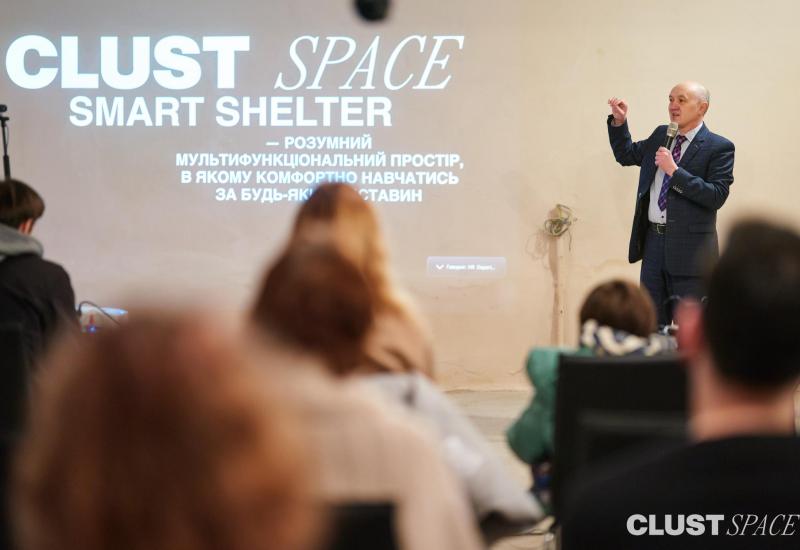On March 28, a press conference was held on the ground floor of the KPI library with the participation of the polytechnic management, representatives of the Ministry of Education and Science and the State Emergency Service of Ukraine, CLUST, and the chief architect of Peker & Partners.
The speakers discussed the issues of new safety standards in the Ukrainian education system on the example of the innovative CLUST SPACE bomb shelter, which will soon be built in KPI.
The conference was organized by representatives of CLUST together with the university administration to draw attention to the problem of shelters at higher education institutions and to find common security solutions that can be scaled up throughout Ukraine.
According to Oleh Stovolos, Head of the Civil Protection Organization Department of the Main Directorate of the State Emergency Service of Ukraine, as of the beginning of September 2022, only 50% of higher education institutions had found premises that could be used as shelters during an emergency. That is, only half of the educational institutions were able to ensure the educational process during the ongoing full-scale war.
However, having a bomb shelter is only part of the solution. It is important to create the right conditions for continuous comfortable learning. That's why Ruslan Tymofeev, founder of CLUST, took the initiative to reorganize existing bomb shelters and turn them into modern educational hubs that will work both in wartime and in peacetime.
"We know for sure that today no Ukrainian has a gray area. There is only white and black. Ukrainians no longer allow businesses to say 'I'm only here to make money'. Business can help implement systemic economic changes. And an incredibly large number of Ukrainian businesses are now involved in this. We would like to be an example of such a business and become a driver of a new approach to security in education, which is why we launched the CLUST SPACE project," Ruslan Tymofeev comments.
The first multifunctional space will appear within a year at Kyiv Polytechnic, in the basement of the library with a total area of 600 m². The smart shelter will be divided into several zones: a large open space for studying and lectures, a reading sector, a video call room, a cafeteria, a play area, and inclusive restrooms. All conference participants were able to evaluate the design project and innovative solutions of the working group using virtual reality technologies.
"Now you are in a room that does not inspire creativity: shabby walls, incandescent lamps. It is very difficult to say that some interesting breakthrough idea will be born here. But the environment itself often inspires new ideas. And it is precisely these tasks - a combination of comfort to ensure and develop new ideas - that were the basis of the project, which today is called Smart Shelter CLUST SPACE," says Vitaliy Pasichnyk, Vice-Rector for Research at Igor Sikorsky Kyiv Polytechnic Institute, about the initiative to build an innovative shelter.
And Oleh Khymenko, Head of the Main Directorate for the Implementation of Policies in the Field of Science and Innovation of the Department of Science and Innovation of the Ministry of Education and Science, emphasized:
"Until recently, only the issue of security was prioritized, that is, only the need to guarantee the safe stay of people. But the combination of several functions in a room - not only vital, but also those that allow you to use this time productively, that is, to leave one comfortable environment and move to another comfortable environment - is very cool, in my opinion. That's why I would like to see this experience scaled up."
The meeting was also attended by architect Pavlo Pecker, who has experience with similar projects in Iraq and Libya. It was his studio that developed the design project for the multifunctional shelter. He noted that it is very important for him personally to encourage young people to stay in the country, to provide them with meaning and create conditions. And quality education is an essential part of this process.

